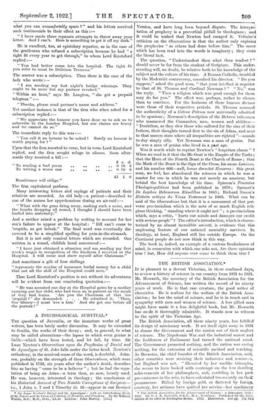A PSYCHOLOGICAL SURVIVAL.*
THE question of Juvenilia, or the immature works of great writers, has been lately under discussion. It may be extended to Senilia, the works of their decay ; and, in general, to what may be called aberrations—the lapses to which even genius is liable—which have been tested, and let fall, by time. Sir Isaac Newton's Observations upon the Prophecies of Daniel and the Apocalypse of St. John falls under the latter head. Newton's orthodoxy, in the received sense of the word, is doubtful. John- son, probably on the strength of these Observations, which were published in 1733, six years after the author's death, describes him as having " come to be a believer " ; but he had the repu- tation of being an Arian—a term then, as now, loosely used. He was, however, interested in theology ; the conclusions of his Historical Account of Two Notable Corruptions of Scripture- i.e., 1 John v. 7 and 1 Timothy iii. 16—appear in our Revised • Sir Isaac Newton's Daniel and the Apocalypse : with an Introductory Study of the Nature and the Cause of Unbelief, of Miracles, and Prophecy. By Sir William M.D., D.Sc., LL.D. London : John Murray. [138.1
Version, and have long been beyond dispute. The interpre- tation of prophecy is a proverbial pitfall to theologians ; and it could be wished that Newton had escaped it. Voltaire's criticism on the Observations is that the author only explains the prophecies " as others had done before him." The sneer which has been read into the words is imaginary ; they state the literal fact.
The question, " Understandest thou what thou modest ? " should never be far from the student of Scripture. This under-. standing will, no doubt, be relative both to his knowledge of the subject and the culture of his time. A Roman Catholic, troubled by the Modernist controversy, consulted his director. " Do you suppose," asked the good man, " that your intellect is superior to that of St. Thomas and Cardinal Newman ? " " No," was the reply. " Then a religion which was good enough for them may do for you." The effect was, perhaps, rather to silence than to convince. For the horizons of these famous divines were those of their respective periods. St. Thomas assumed the authenticity of a Catena Patrum now universally admitted to be spurious ; Newman's description of the Hebrew tribesmen who massacred the Canaanites, men, women and children- " Doubtless, as they slew those who suffered for the sins of their fathers, their thoughts turned first to the sin of Adam, and nest to that unseen state where all inequalities are righted "—sounds to-day simply silly. Yet Newman was a man of genius. But he was a man of genius who lived in a past age.
Was it worth while to reprint Newton's " forgotten classic " ? When we read in it that the He-Goat is the Empire of the Turks ; that the Horn of the Fourth Beast is the Church of Rome ; that the Mark of the Beast is the Sign of the Cross, his name Lateinos, and his number 666—well, bonus dormitat Homerus : this great man, we feel, has abandoned the sciences in which he was a master for one in which he was not merely an amateur, but behind the best knowledge of his time. Spinoza's Tractatus Theologicopoliticus had been published in 1670 ; Spencer's De Legibus He,brceorum Ritualibus in 1685 ; Richard Simon's Histoire critique du Vieux Testament in 1683. What can be said of the Observations but that it is a monument of that per- verse provincialism which is the note of so much English reli- gious thinking, " standing where it ought not " ; a provincialism which, says a critic, " hurts our minds and damages our credit with serious people" ? The editor's introduction, which is charac- terized by an almost incredible naivete, is evidence that this unpleasing feature of our national mentality survives. In theology, at least, England still lies outside Europe. On the Continent people do not now think in this way.
The book is, indeed, an example of a curious freakishness of mind, in connexion with which one asks not, Are these opinions true ? but, How did anyone ever come to think them true ?


































 Previous page
Previous page